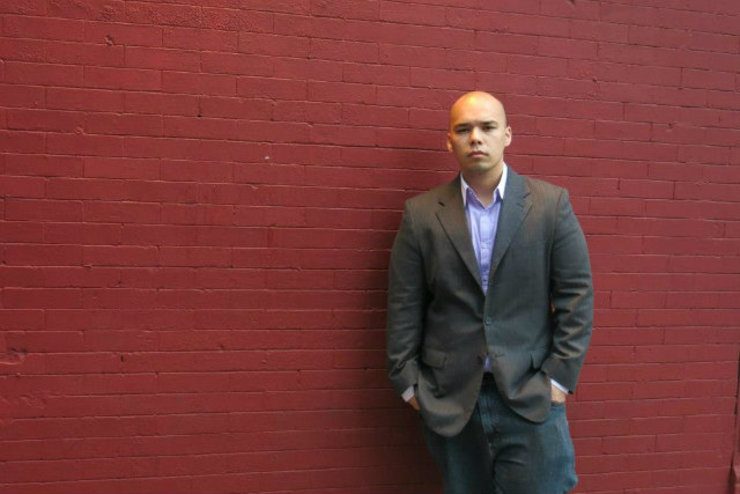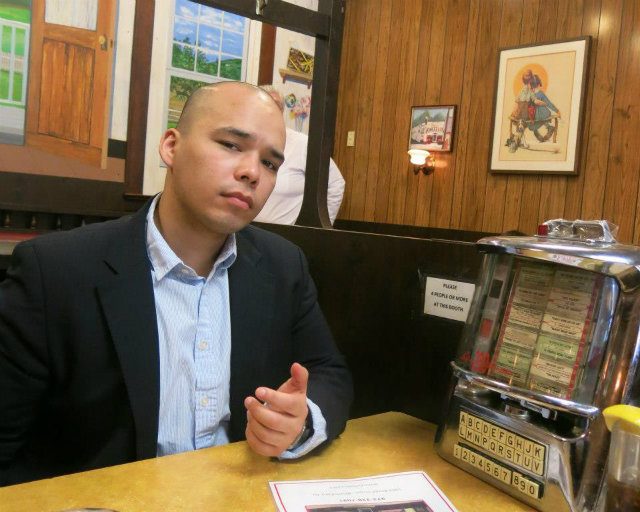SUMMARY
This is AI generated summarization, which may have errors. For context, always refer to the full article.

LONDON, England – Every morning, as I startle myself to wakefulness, I lie in bed and stare at the ceiling. When the light refracts through the space atop my curtains, I can see the silhouettes of cars through the rotunda of Market! Market! as they dance in a seemingly endless circuit around Metro Manila’s Bonifacio Global City.
It is this sight that confirms to me that I’ve made it through the night for another day of life. I’m now 27 years old. When I was younger, I felt that the world owed me the answer to how the sky will look tomorrow and the day after. Yet as I’ve grown older and my understanding of life has evolved through experiences that only I know, I’ve come to appreciate that nothing is guaranteed. And for that reason I never forsake the dancing automobiles on my ceiling.
It is in these moments of isolation where I find myself being most truthful, away from the pretenses and posturing that subconsciously influence the way we recall the past. It’s only human, I assert, that time scars over the past and gives us a new, distorted view of events which we’ve distanced ourselves from. But whenever I’m alone and the veneer of entitlement is drawn back, I remember that the sunrise wasn’t always so reassuring.
To borrow from the dialogue of Langston Hughes, I’ve been cut, stabbed, run over and hit by a car, among other events (never shot and people are rarely tromped by horses these days). Each time I’ve recovered, I’m left in awe of how strong the will to live is in all of us. If such resilience is innate, how much more can we overcome with conscious effort?
It was 3 years ago, on a miserable, icy night in midtown Manhattan, that I finally began to take stock of the life I had been born into. As I stepped off the stage at Carnegie Hall after nervously stumbling through an acceptance speech for an award I had received for my writing, I walked back towards the hallway. With only a handful of cocktail waiters and ushers present, I dropped to the floor in my blue and white suit and banged out a set of pushups.
It was a practice I had learned during sparring sessions at the Union City Boxing Club as a teenager intended to express that I had more left in my reserves than what I had shown to that point. That was the message I wanted to convey with my words. Instead, perhaps more importantly, I reassured myself of that much against the backdrop of clanking glasses and a whirring vacuum cleaner.
The lone intelligible statement I had managed to squeeze out of my head – as pop star Charice stared quizzically through my Tanqueray saturated shell – was a line from the movie Ten Things I Hate About You, “Never let anyone make you feel like you don’t deserve what you want.” Those words which were spoken by the late Heath Ledger, have been my motto in life since I first saw the movie as a middle school student. Until that point, I didn’t fully appreciate my right to a fair shot at life.
Just months prior to my Carnegie date, when I was waiting tables at a Cheesecake Factory restaurant in Hackensack, N.J., I couldn’t have even imagined anyone reading my stories. Years earlier, when I was wrapping vegetables at a Japanese supermarket in Edgewater at age 17, I could not have foreseen that my hobby would be my key to discovering more of the world than I could see from my bedroom window.
Today, I edit the sports section of the site that you’re reading this essay on, having relocated to my father’s homeland of the Philippines two years ago from my native New Jersey to explore career options. Since devoting myself to writing at age 19, I’ve written for outlets like the New York Daily News, Esquire Philippines, USA Today and The Ring magazine (where I’m still employed).
Along the way I’ve met CEOs of major companies, world champion boxers and heads of state, taking from them whatever life hacks they’ve been willing to impart. I’ve been blessed to get to know some of the most interesting boxers and athletes and tell their stories to the world, to peer behind the curtain to find the humanity in the superhuman.
As far fetched as my dreams seemed early in adulthood, they were far more unfathomable in the beginning of my teenage years. As I stated earlier, personal fulfillment hasn’t come lineally for me. Much of the karma I’d cash in later was paid up front early on.
Bitter sugar
Dealing with people my own age had always been a difficulty for me, and on the schoolyard, that often translated to fights (I was smaller than almost everyone in school and took more ass kickings than I dealt). Fed up, I’d leave school for weeks on end to spend time at the Cliffside Park library, preferring to read Mark Twain and Edgar Allan Poe stories instead of the incomplete excerpts teachers usually assigned in English class.

Around this time I began to bounce around different in-patient “Crisis Intervention Programs,” spending many of my most impressionable years relating with peers whose issues ranged from the self-destructive, like “cutters” (self-mutilators) and the hopelessly suicidal, chronic runaways, drug addicts, to those whose transgressions were directed towards others.
At 13, I was sent to live with relatives in Texas but a change in scenery did little to address my impulsiveness. After another fight I found myself confronted with the police once again. Just a day earlier I had been placed on probation, when an innocuous use of PG-13 profanity in class earned me a citation and deepened my distrust of the classroom. On that day I didn’t feel like defending my case to the judge, and felt less inclined to do so for these officers.
‘I wanted more than life could ever grant me.’
– Billy Corgan, ‘Today’
The officers told me to turn around and put my hands behind my back. I did as I was told, and can still remember the feeling the first time those cold steel bracelets were fastened around my wrists. It was an unbelievable experience; I felt dead and yet so incredibly alive simultaneously. For most people, this happens only on television. I was becoming one of those people I had seen on TV.
I spent the next 3 weeks at a juvenile detention center awaiting a hearing before a judge. Christmas of 2000 passed behind bars without a single visit. I made the most of my time, making friends by helping fellow inmates write letters to their estranged families and reading from the sparse library (I’d made friends with some of the guards who allowed me to keep books in my cell after lights out).
At night, I’d peer through my plexiglass window to the barbed wire fences, wondering how it’d feel to be a passerby looking in this direction, free to wander wherever I wanted. When I’d become exhausted from thinking about matters I couldn’t control, I’d rest my head on my plastic pillow and fixate on the red light from the fire alarm inside the air vent until I passed out.
Even then I knew I was going to do something to make my life better. I didn’t know what; I just knew it wouldn’t happen immediately.
Rooftop ambitions
So far I’ve chosen to omit many of the mitigating factors that had led me to this point because I refuse to indict anyone other than myself for the decisions I’ve made. Accepting ultimate culpability has been empowering to me. A teenager has little control over his environment and is limited in what he can accomplish on his own, but never did I believe I didn’t ultimately control my fate.
As much as I’d like to say that incarceration was the wakeup call I needed to straighten out, that’d be a process that took several years. Yet even as I made my own unorthodox journey of self-discovery through the courts and group homes, I always kept my love for writing and literature in my peripheral. While majoring in computer science at Hudson County Community College, I began my unpaid apprenticeship as a boxing reporter with various online news outlets.
I had little money after losing my first full-time job and would work 8-hour shifts as a day laborer in warehouses for $35 a day so I could care for my little brother Sean and myself. Much of my free time was spent on the roof of our one-room Union City shack, stealing whatever nearby WiFi networks weren’t password protected so I could do research for my stories.
When my laptop was stolen by drug addicts in the neighborhood, I began writing at Internet cafes, going hungry when I didn’t have money left over after I finished a story.
I didn’t make my first dollar on a story until after two years of nonstop writing, and it’d be several more years until I’d make enough to amount to more than beer money. If not for those times, you wouldn’t be reading this essay right now.
Through all of the good times and bad, I’ve come to learn that ambition and a sense of adventure are enough to get you to the threshold of fate. What happens from there is a matter of luck and skill, how you play the hand you’re dealt. But considering how many go through their entire lives without getting their big shot, it’s as much as anyone could ask.
I have few answers for my own questions and even fewer leads for anyone else. But if there’s one thing I can tell anyone, it’s how invaluable the audacity to dream bigger than is reasonable can be. Allow your desire to realize your dreams to engulf your soul like a forest being eaten by fire in a drought.
In the end, all we have to ourselves are our dreams. – Rappler.com
Ryan Songalia is the sports editor of Rappler, a member of the Boxing Writers Association of America (BWAA) and a contributor to The Ring magazine. He can be reached at ryan.songalia@rappler.com. Follow him on Twitter: @RyanSongalia.
Add a comment
How does this make you feel?
There are no comments yet. Add your comment to start the conversation.